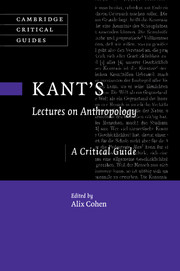Book contents
- Kant’sLectures on Anthropology
- Series page
- Kant’sLectures on Anthropology
- Copyright page
- Contents
- Tables
- List of contributors
- Preface
- Translations and abbreviations
- Introduction
- Chapter 1 Kant’s lectures on anthropology: some orienting remarks
- Chapter 2 Self-cognition and self-assessment
- Chapter 3 Kant on the phenomenology of touch and vision
- Chapter 4 Meat on the bones: Kant’s account of cognition in the anthropology lectures
- Chapter 5 The anthropology of cognition and its pragmatic implications
- Chapter 6 Affects and passions
- Chapter 7 The inclination toward freedom
- Chapter 8 Empirical desire
- Chapter 9 Kant as “vitalist”: the “principium of life” inAnthropologie Friedländer
- Chapter 10 Indispensable education of the being of reason and speech
- Chapter 11 Kant on civilisation, culture and moralisation
- Chapter 12 Cosmopolitical unity: the final destiny of the human species
- Chapter 13 What a young man needs for his venture into the world: the function and evolution of the “Characteristics”
- Bibliography
- Index
Chapter 2 - Self-cognition and self-assessment
Published online by Cambridge University Press: 05 November 2014
- Kant’sLectures on Anthropology
- Series page
- Kant’sLectures on Anthropology
- Copyright page
- Contents
- Tables
- List of contributors
- Preface
- Translations and abbreviations
- Introduction
- Chapter 1 Kant’s lectures on anthropology: some orienting remarks
- Chapter 2 Self-cognition and self-assessment
- Chapter 3 Kant on the phenomenology of touch and vision
- Chapter 4 Meat on the bones: Kant’s account of cognition in the anthropology lectures
- Chapter 5 The anthropology of cognition and its pragmatic implications
- Chapter 6 Affects and passions
- Chapter 7 The inclination toward freedom
- Chapter 8 Empirical desire
- Chapter 9 Kant as “vitalist”: the “principium of life” inAnthropologie Friedländer
- Chapter 10 Indispensable education of the being of reason and speech
- Chapter 11 Kant on civilisation, culture and moralisation
- Chapter 12 Cosmopolitical unity: the final destiny of the human species
- Chapter 13 What a young man needs for his venture into the world: the function and evolution of the “Characteristics”
- Bibliography
- Index
Summary
- Type
- Chapter
- Information
- Kant's Lectures on AnthropologyA Critical Guide, pp. 18 - 37Publisher: Cambridge University PressPrint publication year: 2014
- 5
- Cited by

